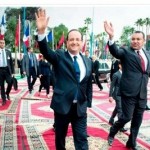François Hollande’s 3-4 April visit to Morocco provided an opportunity for France’s Parti Socialiste and Morocco’s leadership to leave behind old suspicions, but with a delegation of 50 business leaders, eight ministers and more than 20 agreements to sign, it was even more a traditional affirmation of France’s economic interest in the North African kingdom. Casablanca, like Rabat and Bordeaux before it, has a shiny new tram system, underlining the fact that French business remains a major player even while the Moroccan economy diversifies. The next of the ‘grands projets’ that King Mohammed VI is pushing, even during a period of austerity, will be a high-speed train. France is providing a huge credit package to help finance its construction, along with Alstom-supplied equipment. This project will help to open up northern Morocco, but it remains controversial, as critics say an enthusiastic royal palace and muscular French economic diplomacy have imposed the deal on the government. Such deals can help France to reclaim its historic position as Morocco’s number one supplier, a position taken in 2012 by Spain – another state that is looking to export deals to help overcome the eurozone doldrums.
Meanwhile Beïdaoui (Casablanca residents) took wry amusement from the short-term but substantial investment in cleaning their teeming metropolis, with potted plants and red carpets that vanished the day Hollande left. Algerian Overture Some commentators observed that French leaders traditionally make Morocco the first North African stop of their mandate, whereas Hollande set foot first in Algeria in December 2012. His ‘historic visit,’ as the country celebrated 50 years of independence, came closer than any before to a French leader offering an apology for abuses committed during the 1954-62 Algerian war of independence. It allowed Hollande to push for improved political, business and social cooperation in a complex relationship. It also triggered speculation that France sought the approval of President Abdelaziz Bouteflika and his security chiefs for a more robust role in the Sahel, which the Algerian intelligence services have long considered to be their fief. This received dramatic confirmation with the French intervention in Mali in January, about which Algeria has remained uneasy. Algiers remains just as uneasy over speculation that France might push for rapprochement in the Maghreb, where the Algerian-Moroccan border has been closed since 1994. This would help to reinforce regional stability and open up markets. There are limits to what Paris might achieve. Hollande used his Moroccan visit to thank King Mohammed for supporting the Malian intervention and for Rabat’s cooperation in tackling regional security threats. According to a senior European intelligence analyst, “Security relations remain much easier for France than with Algeria, but there are real limits even to this: the French know well that Morocco’s big interest in Mali is to secure the view that the status quo works in the Western Sahara.” There has been speculation that Paris may play a more muscular role in trying to settle the Western Sahara dispute.








